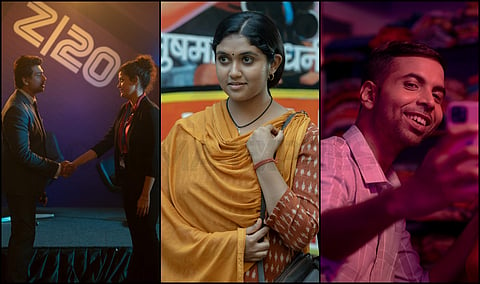Ankahi Kahaniya Review: Netflix anthology offers love on the quiet
Rating:(2.5 / 5)
Bollywood directors rarely wrestle with love honestly but when they do, the entry point is almost always male. The pattern is old: the chirpy scoundrels of Abhishek Chaubey's Ishqiya movies, the man-children of Saket Chaudhary's early features, the clashing old friends in Ashwiny Iyer Tiwari's Bareilly Ki Barfi. The audience is just better oriented to a love story when told from a dominant gaze. The sequence of Boy meets Girl stays the same.
Streaming on: Netflix
Directors: Abhishek Chaubey, Ashwiny Iyer Tiwari, Saket Chaudhary
Cast: Abhishek Banerjee, Kunal Kapoor, Rinku Rajguru, Zoya Hussain, Delzad Hiwale
Two out of three films in Ankahi Kahaniya break this pattern. In Abhishek's film, it's Manjari (Rinku Rajguru) who first lays eyes on Nandu (Delzad Hiwale), an usher at the single-screen theatre she visits. Tanu (Zoya Hussain) seeks out Manav (Kunal Kapoor) in Saket's segment. Even Ashwiny's short, with its inanimate female surrogate, seems to unfold on an equal footing.
Her film opens at a garment store in the thick of Mumbai. Pradip (Abhishek Banerjee) is an immigrant with no one to speak to. His loneliness is accentuated through sound — Tumhari premika humare paas hain, he hears from an unidentified source, likely a movie playing on someone's phone — though Ashwiny also finds a way to verbalise Pradip's inner turmoil. He starts talking to, and then caressing and dressing up and going on dates with, a mannequin at the store.
It's a thin conceit, and writers Piyush Gupta, Shreyas Jain and Nitesh Tiwari soon abandon the lonely urban poetry of Spike Jonze's Her for a more formal structure. You feel the pressure of a feature-like graph exert itself on this film. The psychosexual themes (Pradip is caught and accused of indecency) are never explored beyond a point. The neat visual design fails Abhishek's subtle, unadorned performance. He is a charming silent player, endowing a late scene with all the awkwardness of a real reunion.
Awkwardness also dominates the initial minutes of Abhishek Chaubey's short. At a rickety theatre, Manjari and Nandu drown their daily drudgery in movie dreams. He imagines her as a Malini-esque goddess, backlit and touching a crumpled ticket to her lips. She, in turn, pictures him as an 80s star, walking up in bright vintage denims and dispatching a goon. Behind her, on the wall, is a screaming poster. "Premacha Bobhata," it reads. "Love's lament."
Beneath this surface romance is a deeper love affair between cinematographer Avinash Arun and the movie halls of old. He captures loving details: posters, coffee machines, samosas still handed out in greasy paper plates. Manjari has a sweet tooth; when Nandu offers her an icecream, she plainly asks if she can have another one. It's never stated out loud, but the film is set in the past when modest single-screen theatres ruled and a daily trip wouldn't break the bank. Abhishek evokes a range of forgotten moods. It's telling that, though Nandu and Manjari devour grand gestures on screen, their own story is of a parallel and middle cinema mould. Life's a (rocky) beach.
Far from these working-class worlds, Saket Chaudhary's film goes in a different direction entirely. Tanu is married to Arjun (Nikhil Dwivedi), who she is certain is cheating on her. In an alarming rage, she stalks the woman on Facebook, then messages her husband on LinkedIn. "See a therapist," tuts Manav (Kunal Kapoor) when they meet. But she convinces him somehow, bringing him to the resort where their spouses first met. There, with increasing creepiness, they visualise every detail, like a jilted Minority Report in reverse—kooky, sentimental sci-fi without the sci.
Saket struggles the most with the short-length format. He has 40 minutes, and a lifetime of emotions to pack. The loopy structure might have seemed fun on paper but gives away the show. I couldn't care much about the individual character histories; they don't register emotionally or intrigue contextually. The casting is accurate, too accurate: Kunal in a man-bun talking about startups (the actor runs the successful Ketto platform) is a bit on-the-nose. The best scene, predictably, is by the sea, a little musical interlude before the yapping resumes. Who said that thing about pictures and words?


